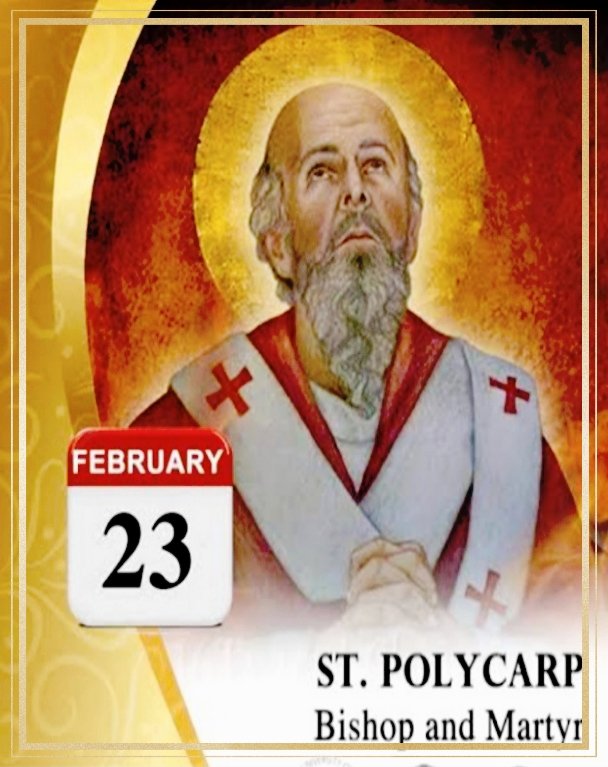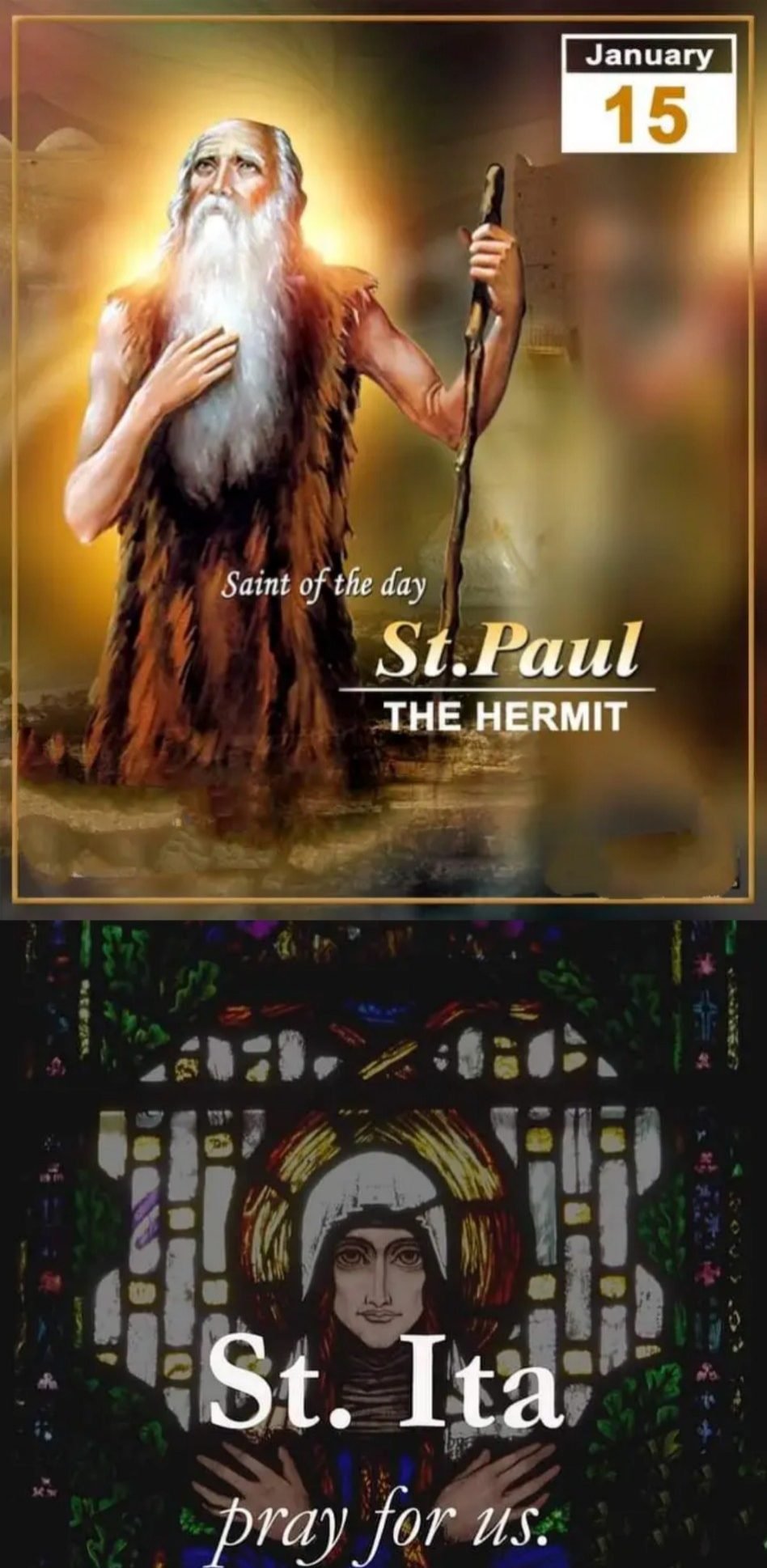
Joel 2:12
February 22, 2023
John 8: 31-32
February 23, 2023FEAST OF SAINT POLYCARP, BISHOP OF SMYRNA AND MARTYR
FEAST DAY – 23rd FEBRUARY
Polycarp AD 69 – 155, was a Christian bishop of Smyrna. According to the Martyrdom of Polycarp, he died a martyr, bound and burned at the stake, then stabbed when the fire failed to consume his body. Polycarp is regarded as a saint and Church Father in the Catholic, Eastern Orthodox, Oriental Orthodox, Anglican, and Lutheran churches.
St. Polycarp was one of the apostolic Fathers who heard the Apostle John preach and became his disciple. He received St. Ignatius when he came as a prisoner on his way to martyrdom in Rome in 110 A. D. In his letter to Polycarp, Ignatius urged him to “Give ye heed to the bishop that God may give heed to you.” Polycarp subsequently became Bishop of Smyrna.
According to Irenaeus, Polycarp was a companion of Papias, another “hearer of John”, and a correspondent of Ignatius of Antioch. Ignatius addressed a letter to him and mentions him in his letters to the Ephesians and to the Magnesians. Polycarp’s own Epistle of Polycarp to the Philippians gives us some insights to the early usage of the New Testament from the quotes used within his letter.
Irenaeus regarded the memory of Polycarp as a link to the apostolic past. In his letter to Florinus, a fellow student of Polycarp who had become a Roman presbyter and later lapsed into heresy, Irenaeus relates how and when he became a Christian:
“I could tell you the place where the blessed Polycarp sat to preach the Word of God. It is yet present to my mind with what gravity he everywhere came in and went out; what was the sanctity of his deportment, the majesty of his countenance; and what were his holy exhortations to the people. I seem to hear him now relate how he conversed with John and many others who had seen Jesus Christ, the words he had heard from their mouths.”
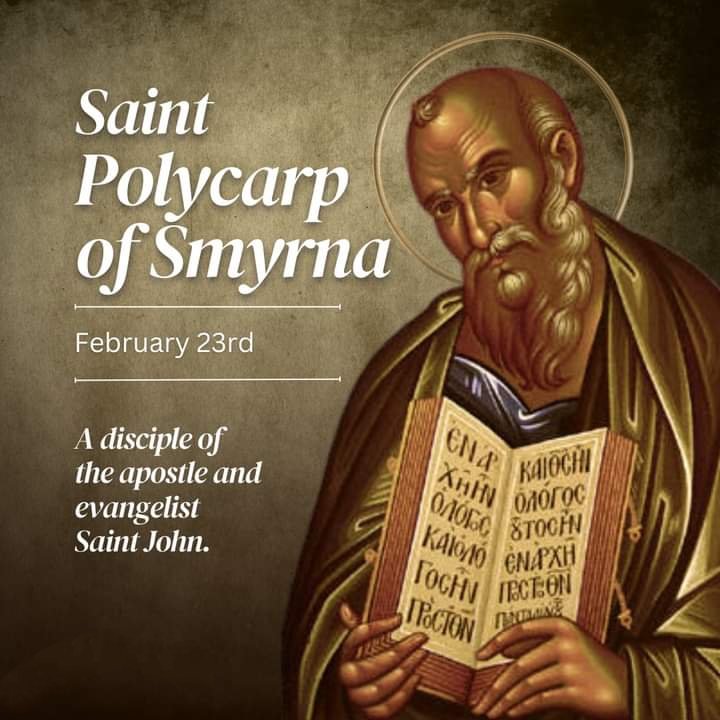
In particular, he heard the account of Polycarp’s discussion with John and with others who had seen Jesus. Irenaeus reports that Polycarp was converted to Christianity by apostles, was consecrated a presbyter, and communicated with many who had seen Jesus. He writes that he had had the good fortune, when young, to know Polycarp, who was then advanced in years.
St. Irenaeus praises him for his respect and devotion to tradition and sound doctrine. He may have been him whom St. John addressed in Revelation 2: 11, as the “angel of the church in Smyrna,” to whom the Master says, “Be thou faithful unto death, and I will give thee a crown of life.” About 155 or 156 A.D. he was sentenced to a martyr’s death. There are excerpts from his only surviving letter and from the “The Martyrdom of Polycarp,” the oldest extant account of Christian martyrdom, written in the form of a letter from the Church of Symyrna to the Church of God at Philomelium.
According to Irenaeus, during the time his fellow Syrian Anicetus was Bishop of Rome, Polycarp visited Rome to discuss differences in the practices of the churches of Asia and Rome. Irenaeus states that on certain things the two speedily came to an understanding, while as to the observance of Easter, each adhered to his own custom, without breaking off full communion with the other.
Polycarp followed the Eastern practice of celebrating the feast on the 14th of Nisan, the day of the Jewish Passover, regardless of the day of the week on which it fell, while Anicetus followed the Western practice of celebrating the feast on the first Sunday following the first full moon after the spring equinox. Anicetus allowed Polycarp to celebrate the Eucharist in his own church, which was regarded by the Romans as a great honor.
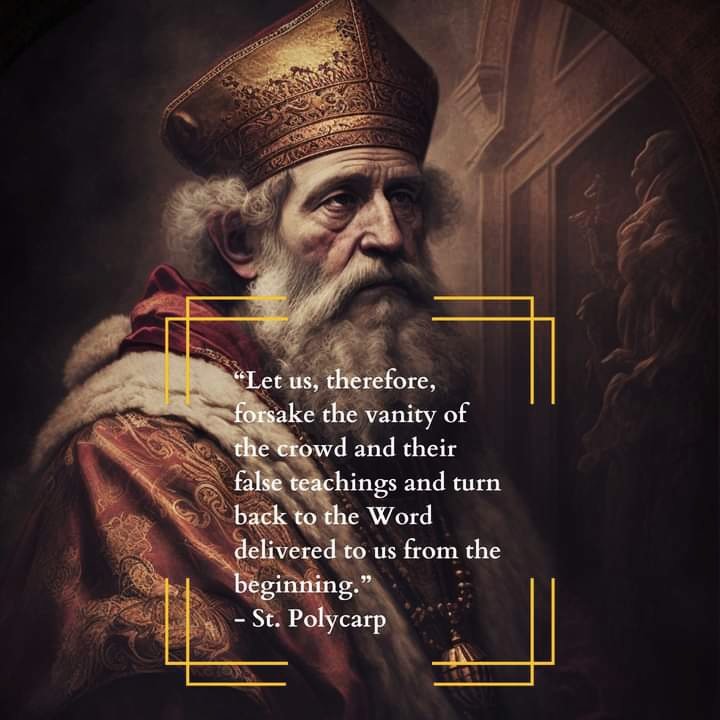
The date of Polycarp’s death is in dispute. Eusebius dates it to the reign of Marcus Aurelius, c. 166–167. However, a post-Eusebian addition to the Martyrdom of Polycarp, dates his death to Saturday, February 23, in the proconsulship of Lucius Statius Quadratus, c. 155 or 156. These earlier dates better fit the tradition of his association with Ignatius and John the Evangelist.
Polycarp occupies an important place in the history of the early Christian Church. He is among the earliest Christians whose writings survived. He was an elder of an important congregation that was a large contributor to the founding of the Christian Church. He is from an era whose orthodoxy is widely accepted by Eastern Orthodox Churches, Oriental Orthodox Churches, Church of God groups, Sabbatarian groups, mainstream Protestants and Catholics alike.
Irenaeus, who as a young man had heard Polycarp preach, described him as “a man who was of much greater weight, and a more steadfast witness of truth, than Valentinus, and Marcion, and the rest of the heretics”. Polycarp lived in an age after the deaths of the apostles, when a variety of interpretations of the sayings of Jesus were being preached.
His role was to authenticate orthodox teachings through his connection with the apostle John: “a high value was attached to the witness Polycarp could give as to the genuine tradition of old apostolic doctrine” “his testimony condemning as offensive novelties the figments of the heretical teachers”. Irenaeus states that on Polycarp’s visit to Rome, his testimony converted many disciples of Marcion and Valentinus.
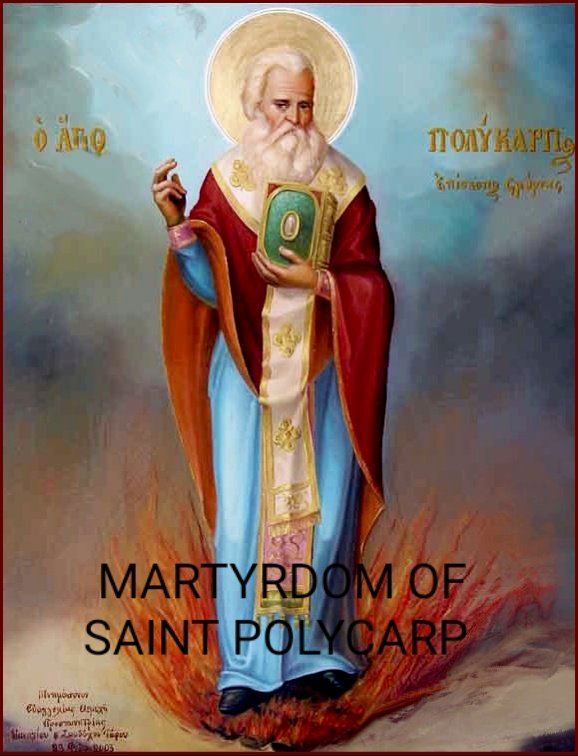
It is written about the death of Polycarp, that before being burned alive, “When the [Roman] Proconsul urged him and said, ‘Take the oath [to the emperor as god] and I will release you; revile Christ’ Polycarp answered: ‘Eighty-six years I have served Him, and He has never done wrong.’ How then, should I be able to blaspheme my King who has saved me?”
“. . . In this way and for all things I do praise you, I do bless you, I do glorify you through the eternal and heavenly High Priest, Jesus Christ, your beloved Child: through whom be glory to you with Him and with the Holy Spirit, both now and through ages yet to come. Amen.”
“When he had pronounced this amen, and so finished his prayer, those who were appointed for the purpose kindled the fire. And as the flame blazed forth in great fury, we, to whom it was given to witness it, beheld a great miracle, and have been preserved that we might report to others what then took place.
For the fire, shaping itself into the form of an arch, like the sail of a ship when filled with the wind, encompassed as by a circle the body of the martyr. And he appeared within not like flesh which is burnt, but as bread that is baked, or as gold and silver glowing in a furnace. Moreover, we perceived such a sweet odour [coming from the pile], as if frankincense or some such precious spices had been smoking there.”
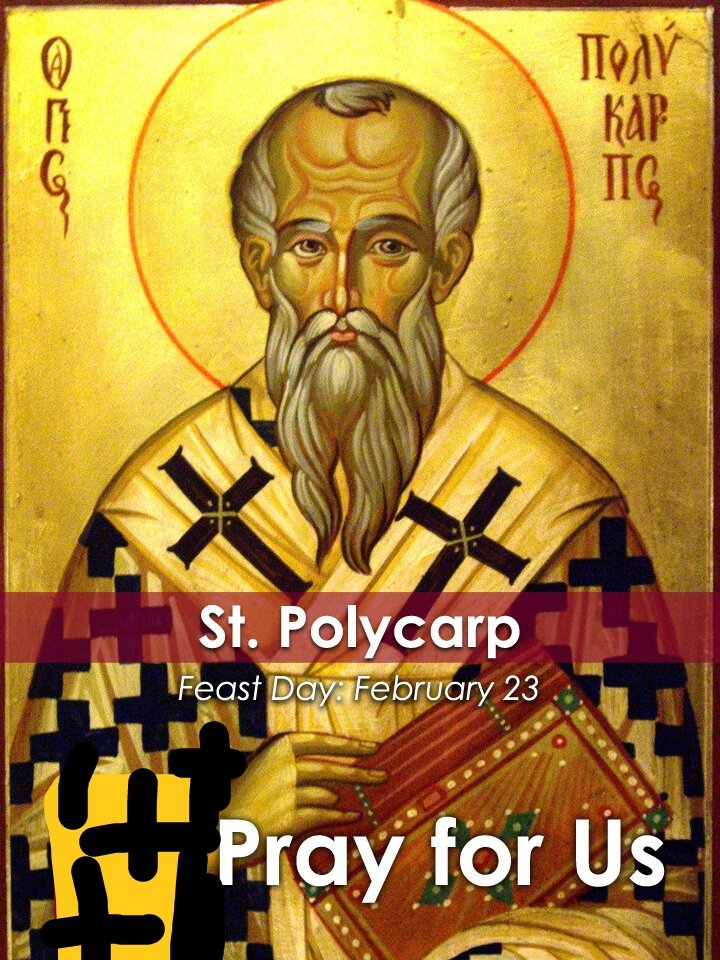
“At length, when those wicked men perceived that his body could not be consumed by the fire, they commanded an executioner to go near and pierce him through with a dagger. And on his doing this, there came forth a dove, and a great quantity of blood, so that the fire was extinguished.
And all the people wondered that there should be such a difference between the unbelievers and the elect, of whom this most admirable Polycarp was one, having in our own times been an apostolic and prophetic teacher, and bishop of the Catholic Church which is in Smyrna. For every word that went out of his mouth either has been or shall yet be accomplished.”
“This, then, is the account of the blessed Polycarp, who, being the twelfth that was martyred in Smyrna (reckoning those also of Philadelphia), yet occupies a place of his own in the memory of all men, in so much that he is everywhere spoken of by the heathen themselves. He was not merely an illustrious teacher, but also a pre-eminent martyr, whose martyrdom all desire to imitate, as having been altogether consistent with the Gospel of Christ.
For, having through patience overcome the unjust governor, and thus acquired the crown of immortality, he now, with the apostles and all the righteous [in heaven], rejoicing(ly) glorifies God, even the Father, and blesses our Lord Jesus Christ, the Savior of our souls, the Governor of our bodies, and the Shepherd of the Catholic Church throughout the world.” He is patron of earache and dysentery.
PRAYER
God of all creation, who were pleased to give the Bishop Saint Polycarp a place in the company of the Martyrs, grant, through his intercession, that sharing with him in the chalice of Christ, we may rise through the Holy Spirit to eternal life.
Through our Lord Jesus Christ, your Son, who lives and reigns with you in the unity of the Holy Spirit, one God, for ever and ever. Amen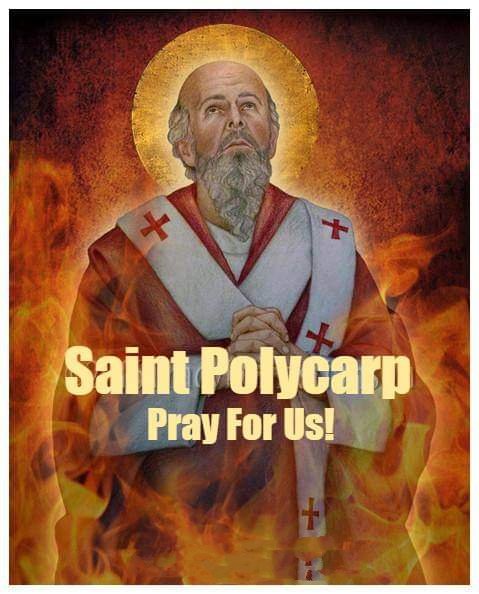
Saint Polycarp, pray for us.

